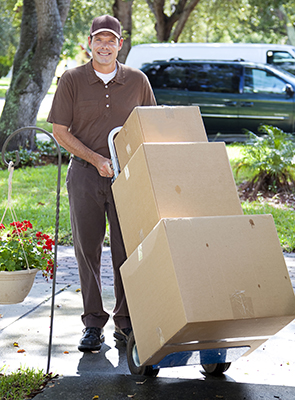 Let’s face it: there are so many professional moving companies out there that you can easily become confused about which one to pick when you need to hire the services of a good mover.
Let’s face it: there are so many professional moving companies out there that you can easily become confused about which one to pick when you need to hire the services of a good mover.
Choosing a moving company at random won’t work because you want to be sure that the relocation partner you select will be reliable, competent, experienced and affordable. When you come to think about it, it’s not too much to ask from moving professionals but still, there are some bad movers out there so you want to play it safe.
Remember that the only logical choice you’ve got in the beginning is to compare moving companies. In fact, comparing movers is a must-do task because only through a good comparative analysis will you be able to get the best mover for yourself.
Follow the 5 major steps below to learn how to compare movers in the best possible way.
Step 1: Compare moving company quotes
The very first step to comparing professional movers is to request accurate cost estimates from them. No, we’re not talking about getting those quotes over the phone or via e-mail (say NO to those types of cost estimation) – we’re talking about asking professional moving companies to actually visit your home in person so that they can do a visual in-home inspection of the things you intend to move.
Note that the only way you can compare moving company prices is to have those in-home survey that end with the issuance of accurate cost estimates. Experienced moving experts – representatives of the respective moving companies – will visit your home at a day and time that is convenient for both parties.
The surveyors will want to inspect all household items that you’re moving with you – they will be especially interested in items that require special packing and handling care – large furniture, antique furniture, a grandfather clock, a piano, etc. Also, they will try to identify possible problems on the day of the move such as long flights of stairs, a non-operational elevator, narrow staircases, narrow hallways, or most often – small doorways.
And as soon as the in-home inspections are over and you’re holding several written cost estimates in your hands, you can then begin to compare the different movers, starting with comparing their moving prices and moving services.
Step 2. Compare moving company rates

Unfunny fact: some moving companies are more expensive than others.
The first thing you’ll notice on your movers quotes will be the prices. You’ll want to pay as little as possible to have your items moved to the new address so you’ll likely to lean toward the cheaper cost estimates in the beginning.
Of course, the price will be one of the deciding factors which mover you choose. When moving locally, the moving cost will be calculated on an hourly basis. When moving long distance, the price will usually be fixed and will depend on the move distance, total weight of the items for moving, additional services, and other secondary price-forming factors.
When you compare movers rates, resist the temptation to pick the lowest bid hastily and be done with it. Your comparative analysis is far from being over.
How much does it cost to hire movers?
Step 3: Compare moving company services
When comparing movers quotes, it’s important to take a closer look at the extra services that each respective mover offers in their estimates. It’s not only about the final price – it’s how that price has been formed that matters more. Ultimately, you want the best relocation offer when it comes to the price-services ratio.
The written estimates you’ve received should list all additional services that either you have requested or the mover has deemed necessary for the successful completion of the job. The most common moving services are packing, unpacking, disassembly and reassembly of large furniture, custom crating, temporary storage, and hoisting massive items through a window or a balcony.
Additional moving services: What good movers offer
Step 4: Compare moving company reviews
Often, comparing moving prices and comparing services alone may not be enough to pinpoint the right mover for you. But even if you’ve almost made up your mind, you’re strongly recommended to also follow this step and check what other customers had to say about the moving companies you are competing for your relocation job.
The best moving companies in the industry know how important it is to keep their reputation with the people they work with (their clients) – good online reputation brings new customers and more revenue. So, one of their goals is to keep delivering high-quality services at affordable prices. And once they manage to achieve that, the good feedback – positive reviews and 5-star ratings – will start appearing on reputable movers reviews websites.
-

You can be the star of your own move.
COMPARE reviews of moving companies by visiting the country’s most trusted websites that provide moving company reviews and ratings left by genuine customers of the movers in question. Three of those trustworthy movers reviews websites are MyMovingReviews, Yelp, and the Better Business Bureau.
- FIND the companies you’re currently researching and first, see their overall rating (usually displayed in stars from 1 to 5), then read some customer testimonials to get a sense of whether most people were satisfied by the movers’ services or not. Yes or no, try to pick up the specifics of what the mover did right and what they did wrong.
- GET a good idea about what you’re up against based on the majority of those moving reviews you just read. It’s never easy to compare moving company reviews because of the fact that some of them will be excessively positive while others will be too negative. Because of this, it’s important that you use those consumer reviews only as a reference point that can help you make an educated decision.
What to expect from full-service movers
Step 5: Compare movers’ reliability and professionalism
So far you’ve managed to compare moving costs and moving reviews of several professional moving companies. Both those comparisons will give you valuable information about which mover will be the better choice for you.
Moving day – the day when you have to move out – approaches fast so you can’t really afford to spend too much time in comparing local moving companies or comparing long-distance movers, depending on how far you’re going. Therefore, it’s time for Step 3 when comparing moving companies – checking their trustworthiness and level of professionalism.
- Licensing information. Compare the legal status of the companies that are bidding for your house moving job. By law, all interstate movers have to be properly licensed by the Government, and in particular, by the U.S. Department of Transportation. When a professional mover meets all the requirements set by the Government, the company is given a unique identifier known as a USDOT number.
Check online the USDOT numbers of the moving companies you’re comparing. - ProMovers. The American Trucking Association (ATA) has created a program called ProMover with the aim of certifying that the professional moving companies that are members of the association can be fully trusted by consumers. ProMovers have successfully passed rigorous background checks and have agreed to uphold ATA’s Code of Ethics.
Make sure you check how professional your movers are by verifying that they are, in fact, ProMovers. - BBB accreditation. Accreditation by the Better Business Bureau (BBB) is another strong indicator that you’re dealing with moving companies you can trust with your belongings. BBB-accredited movers need to adhere to the BBB Standards for Trust – 8 principles that summarize the crucial elements that create and maintain trust between a business and its customers: Build trust, Advertise honestly, Tell the truth, Be Transparent, Honor promises, Be responsive, Safeguard privacy, and Embody integrity.
Here you can check if the moving companies you’re researching are BBB-accredited.
10 things to look for in a professional moving company
How to compare moving companies: Mind the details
Going through the steps above does not guarantee you that you’ll have a clear winner in your search for a good moving company. In the end, the moving estimates will probably be too similar, the consumer reviews will be somewhat confusing and inconclusive, and all of the companies will be properly licensed (USDOT numbers), ProMovers and BBB-accredited. Now what?
Sometimes your choice of a good mover will become clear from the small details that will come up from the time you’ve got into contact with the pros until you’ve been left to make the final choice. To compare movers effectively, here are some questions you should ask yourself. That’s right, it’s your personal decision who to trust in that tough transitional period.
-

Sometimes it’s the small stuff that can help you find a great mover.
How responsive were the movers during the initial contact?
- Were the movers polite, respectful and professional during the in-home inspection?
- Did the movers answer all your questions satisfactorily?
- Were you offered a reasonable and competitive moving price?
- Were the movers willing to offer you a price discount?
- Were you offered all the extra moving services needed to complete the move?
- If you requested the service of professional packing, was the cost of the packing supplies included in the price?
- Were you offered adequate insurance for your valuable items?
How to compare movers: 3 things you must know
You should keep 3 very important things in your mind when comparing moving companies in your area:
1) personal recommendations about movers, offered by people you can actually trust, have much greater value than moving reviews,
2) moving estimates that are too low to be true may spell TROUBLE for you, and
3) it may come down to your hunch about which mover to choose in the end.
#1. Ask friends for moving company recommendations
As hinted above, reading customer reviews about moving companies can be somewhat misleading and inconclusive. Why don’t you ask your friends, colleagues or neighbors if they are familiar with any of the movers you’re comparing? Or maybe they can name you another good mover you can contact for price estimation?
Since you’ve got nothing to lose here, you might as well use your favorite social network platform to ask the million-dollar question, “Can anyone recommend me a good mover?”
How to get friends to help you move
#2. Be mindful of lowball estimates
When you compare moving estimates in writing, you should know that sometimes a price that’s too low is not a good sign. Although rare, it’s possible that you get a lowball estimate – one that deliberately quotes a price that is way lower than the rest.

Good movers are one comparative analysis away.
Try to find a logical explanation for the considerably lower charge. If you can’t, seek an explanation from the mover that supplied it. And if you don’t get a clear answer, then stay away from such a lowball estimate as it could be a sign of moving fraud.
Smart ways to avoid moving scams
#3. Trust your instincts
Despite all the hard work of comparing movers before you hire the services of one of them, at times it all comes down to trusting your instincts and going with the one that you feel will do a good job packing, protecting and transporting your prized possessions.
And if that’s the case, then let’s hope your hunch has been right all along!










Some of these could apply to hiring a moving company that serves seniors.
Great advice for anyone or any business looking to move! #officemoving #officerelocation
Well, deciding which man and van company is the right one for any type of move is hard, since the competition is really really big. That’s why there are so many sites for comparing moving quotes. But, even so you have to know which aspects to look at.
Experience showed, the first thing people ask about is whether the service is insured, followed immediately by the pricing – do they charge by weight, by the hour, by distance, by worker etc.
A great place to start is reading customer reviews. They will tell a lot about the companies service, pricing and much more.
These are great tips for the common first time mover. We all know you learn from the last move, but for newbies these directions are a must. Research is the key to knowing who will be in your home. Most importantly, know how a company charges. If it’s an estimate, what are the cost changing factors. If it’s a guaranteed price, know what’s included. Always ask “How can my price change?”.
Great post full of useful tips about moving-companies, I would like to thank you for the efforts you have made in writing this article. Thanks for sharing such a great information to us.
Very-helpful tips. Keep up the good work 🙂